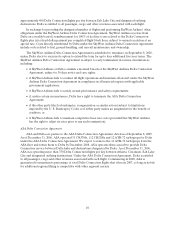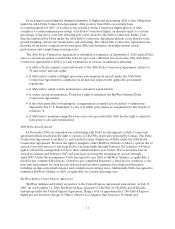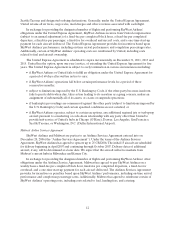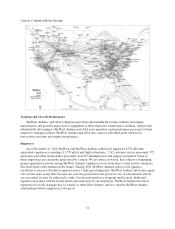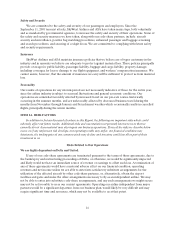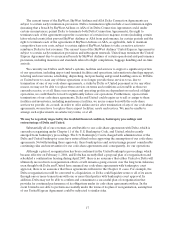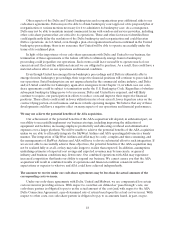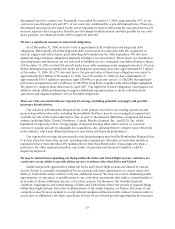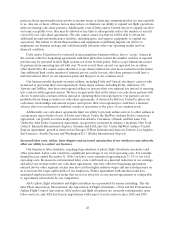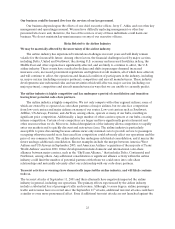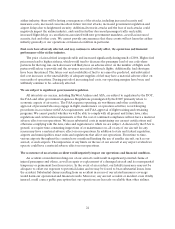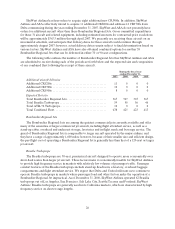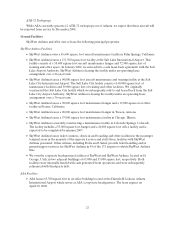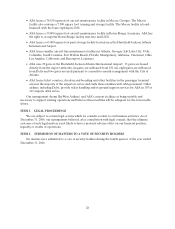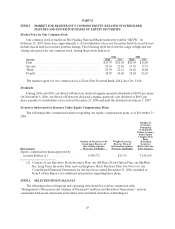SkyWest Airlines 2006 Annual Report Download - page 26
Download and view the complete annual report
Please find page 26 of the 2006 SkyWest Airlines annual report below. You can navigate through the pages in the report by either clicking on the pages listed below, or by using the keyword search tool below to find specific information within the annual report.20
partners, those opportunities may involve economic terms or financing commitments that are unacceptable
to us. Any oneor more of these factors mayreduce or eliminate our ability to expand our flight operations
with our existingcode-share partners. Additionally, evenif Deltaand/or United choose to expand our fleet
on terms acceptable to us, theymay be allowedat any time to subsequently reduce the number of aircraft
covered by our code-share agreements. We also cannot assure youthat we will be able to obtainthe
additional ground andmaintenance facilities, includinggates, and support equipment, to expand our
operations. The failure to obtain these facilities and equipment would likely impede our efforts to
implement our businessstrategyand could materially adversely affect our operating results and our
financial condition.
Delta and/or United may be restricted in increasing their business with us, dueto “scope” clauses in
the current collective bargaining agreements with their pilots that restrict the number and size of regional
jets that may be operated in their flightsystems not flown by theirpilots.Delta’s scopelimitations restrict
its partners from operating aircraft with over 70 seats even if those aircraft are operated for an airline
other than Delta. We cannot assure that these scope clauses will not become more restrictive in the future.
Anyadditional limit on the number of regional jets we can fly for our code-share partners could have a
material adverse effect on ourexpansion plans and the price of our common stock.
Our business modeldepends on major airlines, includingDelta and United, electing to contract with
us insteadofoperating theirown regional jets. Somemajor airlines, including Delta, American, US
Airways and JetBlue, own their ownregional airlines or operatetheir own regional jets instead of entering
into contractswith regionalcarriers. We have no guarantee that in the future our code-share partners will
chooseto enter into contracts with us instead of operating their own regional jets. Our partners are not
prohibited from doingso underourcode-shareagreements.Adecision by Delta or Unitedtophase out
code-share relationships and instead acquire and operate their own regional jets could have a material
adverseeffecton our financialcondition, resultsof operations or the price of ourcommon stock.
Additionally, ourcode-share agreementslimit ourability to provide airline services to other airlines in
certain major airport hubs of each of Delta and United. Under theSkyWest Airlines Delta Connection
Agreement, our growth is contractuallyrestricted in Atlanta, Cincinnati, Orlando and Salt Lake City.
Under theASA Delta Connection Agreement, ourgrowth is restricted in Atlanta, Cincinnati, New York
(JohnF. Kennedy International Airport), Orlando and Salt Lake City. Under SkyWest Airlines’ United
Express Agreement, growth is restricted in Chicago (O’Hare International Airport), Denver, Los Angeles,
San Francisco, Seattle/Tacomaand Washington D.C. (Dulles International Airport).
Increased labor costs, strikes, labor disputes and increased unionizationofour workforces may adversely
affectour ability to conduct our business.
Our business is labor intensive, requiring large numbers of pilots, flight attendants, mechanics and
other personnel. Labor costs constitute a significant percentage of our total operating costs. For example,
during the year ended December 31, 2006, our laborcosts constituted approximately 23.3% of our total
operating costs. Increases in our unionized labor costs could result in amaterial reduction in our earnings
and affectour revenue under our code-shareagreements. Anynew collective bargainingagreements
enteredinto by other regional carriers may also result in higher industry wages andincreased pressure on
us to increase thewages and benefits of our employees. Future agreements with unionized and non-
unionizedemployees may be on terms that arenot as attractiveasourcurrentagreements or comparable
to agreements enteredinto by ourcompetitors.
ASA’s pilots, flight attendants and flight controllers are represented by unions, including: The Air
Line Pilots Association, International, the Association of Flight Attendants—CNA and theProfessional
Airline Flight Control Association.ASA’s pilots and flight attendants are currently working under open
labor contracts, and ASA has been in negotiations with respect to such contracts since 2002 and 2003


